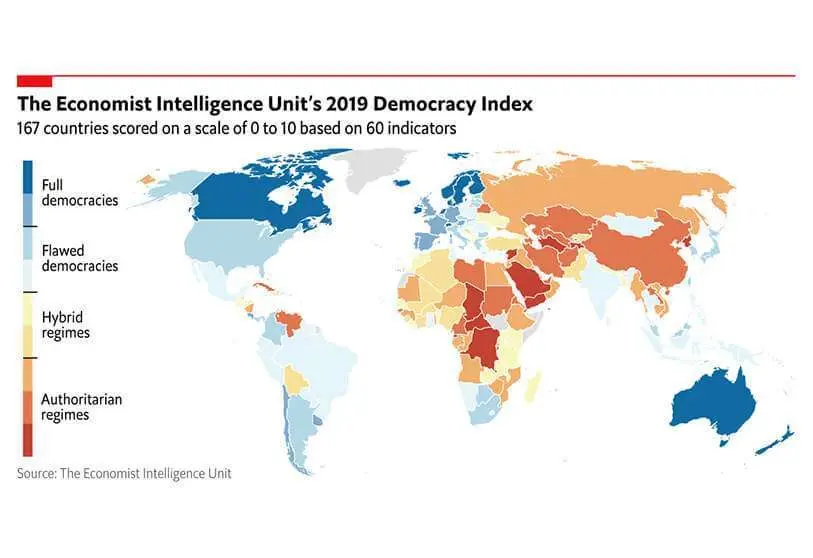Warning: global democracy in decline

In the 2020 edition of The Economist Intelligence Unit’s annual Democracy Index, which provides a snapshot of the state of democracy worldwide, last year saw a striking deterioration in the quality of democracy and civil liberties that is causing deep concern among democracy scholars.
The report "Democracy index 2020: in sickness and in health" details how 70 per cent of the countries monitored (a total of 167) experienced an "unprecedented" regression in their democracy.
"The pandemic has wreaked havoc as civil liberties recede; a series of drastic decisions, such as a lockdown, to protect lives have led to further detrimental consequences on democratic health and civil restrictions," the report said.
The global average democracy index in 2020 fell to its lowest level since 2006, as civil liberties were lost, intolerance and censorship increased.
"Only 49.4% of the world's population lives in a democracy: of these, 8.4% live in full democracies and the rest, 41%, in flawed democracies; the other half of the people live in hybrid regimes and the other half in authoritarian regimes," according to the report.
The issue dismays: for Simon Tisdall, the "bad guys" worldwide are winning; in an article published in The Guardian, the political analyst wonders if anyone will stand up to them.
"From the coup in Myanmar to the autocratic regimes in China and Russia, western values are under increasing threat," Tisdall warned.
The US president himself is aware of the fine line: after taking office in the United States, several of his speeches pointed harshly to Russia and China as examples of authoritarianism that must be combated.
Autocracies are a real danger. In the case of Russia, Biden and his cabinet remain aligned around the protection of human rights and freedom of expression.
The first frictions with Putin have already occurred over Navalny. It will be far from easy to move the pieces in the geopolitical chess game without clashing with the Kremlin, and it will be necessary to be careful to seek consensus rather than dissent.
A recent and interesting move between the United States and Russia (without Trump in the middle) has been the renewal of the Strategic Arms Reduction Treaty, or New Start, for another five years; in this way, an agreement that limits the number of strategic nuclear weapons to a maximum of 1,550 nuclear warheads and 700 ballistic systems per country will remain in force.
The dismantling of the Soviet bloc at the time of Mikhail Gorbachev and Ronald Reagan, when the end of the Cold War was announced, brought light towards a future in which, at least, the Western model prevailed.
I am referring not only to the political model of the West upholding the values of democracy and freedom of expression and many other fundamental human rights, but also to economic freedom.
At the end of the last century, the United States in particular, defended this binomial: political freedom and economic freedom both as the ideal model for a society that, in the long run, would benefit more than harm from exercising its power of choice.
But with the so-called "iron curtain" in place, the new real threat to US imperialism has to do with the enormous power of China, which has also tattooed its communist verticality on its constitution, the quintessence of all that is bad according to Western values, and which shows that the war is still ideological as well. Communism is not dead; it is more alive than ever and totalitarian threats are just around the corner.


